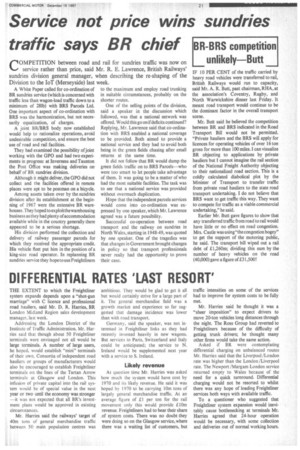DIFFERENTIAL RATES 'LAST RESORT'
Page 23

If you've noticed an error in this article please click here to report it so we can fix it.
THE EXTENT to which the Freightliner system expands depends upon a "shot-gun marriage" with C licence and professional road hauliers, said Mr. D. R. Harries, BR London Midland Region sales development manager, last week.
Addressing the London District of the Institute of Traffic Administration. Mr. Harries said that though about 50 Freightliner terminals were envisaged not all would be large terminals. A number of large users, he hoped, would establish "mini" terminals of their own. Consortia of independent road hauliers or groups of manufacturers would also be encouraged to establish Freightliner terminals on the lines of the Tartan Arrow terminals at Glasgow and London. This infusion of private capital into the rail system would be of special value in the next year or two until the economy was stronger —it was not expected that all BR's investment plans would be approved in existing cire um stances.
Mr. Harries said the railways' target of 40m tons of general merchandise traffic between 50 main population centres was ambitious. They would be glad to get it all but would certainly strive for a large part of it. The general merchandise field was a growth market and experience so far suggested that damage incidence was lower than with road transport.
Germany. said the speaker, was not interested in Freightliner links as they had recently invested heavily in new wagons. But services to Paris, Switzerland and Italy could be anticipated; the service to N. Ireland would be supplemented next year with a service to S. Ireland.
Likely revenue
At question time Mr. Harries was asked bow much the system would have cost by 1970 and its likely revenue. He said it was hoped by 1970 to be carrying 10m tons of largely general merchandise traffic. At an average figure of £1 per ton for the rail movement only this would provide £10m revenue. Freightliners had to bear their share of system costs. There was no doubt they were doing so on the Glasgow service, where there was a waiting list of customers, but traffic intensities on some of the services had to improve for system costs to be fully met.
Mr. Harries said he thought it was a "sheer imposition" to expect drivers to move 20-ton vehicles long distances through the night. The Ross Group had reverted to Freightliners because of the difficulty of getting trunk drivers; he thought many other firms would take the same action.
Asked if BR were contemplating differential charging on unbalanced routes Mr. Harries said that the Liverpool/London rate was higher than the London /Liverpool rate. The Newport /Margam-London service returned empty to Wales because of the need for a quick turnround. Differential charging would not be resorted to whilst there was any hope of loading Freightliner services both ways with available traffic.
To a questioner who suggested that Freightliner system expansion would inevitably cause bottlenecking at terminals Mr. Harries agreed that 24-hour operation would be necessary, with some collection and deliveries out of normal working hours.












































































































